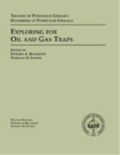Depositional sequence identification
(Redirected from Identifying depositional sequences)
Jump to navigation
Jump to search
| Exploring for Oil and Gas Traps | |

| |
| Series | Treatise in Petroleum Geology |
|---|---|
| Part | Critical elements of the petroleum system |
| Chapter | Sedimentary basin analysis |
| Author | John M. Armentrout |
| Link | Web page |
| Store | AAPG Store |
A depositional sequence is bounded by unconformities or the correlative conformity. It is subdivided by internal surfaces of transgression and maximum flooding.[1][2] Each of these surfaces is chronostratigraphically significant, consistently separating older strata from younger strata.
Identifying data
To identify depositional sequences, we use the following:
- Seismic record sections
- Biostratigraphic histograms
- Wireline logs
- Detailed measured stratigraphic sections
- Combinations of the above items
Procedure
Use the procedure below to identify depositional sequences.
- Identify depositional sequences in seismic reflection profiles, correlating sequence boundaries throughout a data grid of seismic reflection profiles.
- Analyze biostratigraphic data for age-significant bioevents and abundance patterns that may suggest depositional sequences.
- Analyze the depositional patterns from wireline logs, integrate the biostratigraphic data with correlated well log and seismic data, and select candidate depositional sequences.
- Make regional stratigraphic sections by integrating seismic profile interpretations, biostratigraphic analyses, and regional well log cross sections.
- Identify depositional sequences based on the fully integrated data set.
See also
- Definitions of depositional system elements
- Identifying depositional sequences in seismic sections
- Identifying depositional sequences from biostratigraphic data
- Recognizing stacked depositional sequences in seismic profiles
- Recognizing stacked depositional sequences from well data
References
- ↑ Vail, P. R., 1987, Seismic stratigraphy interpretation procedure, in A. W. Bally, ed., Atlas of Seismic Stratigraphy: AAPG Studies in Geology No. 1, p. 1–10.
- ↑ Mitchum, R. M., Jr., and J. C. Van Wagoner, 1990, High-frequency sequences and eustatic cycles in the Gulf of Mexico basin: Proceedings, Gulf Coast Section SEPM 11th Annual Research conference, p. 257–267.